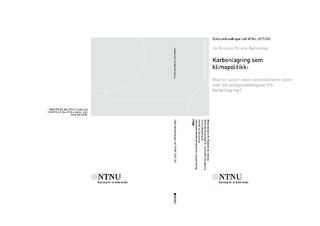| dc.contributor.advisor | Fermann, Gunnar | |
| dc.contributor.advisor | Moe, Espen | |
| dc.contributor.author | Røttereng, Jo-Kristian Stræte | |
| dc.date.accessioned | 2018-01-10T08:17:43Z | |
| dc.date.available | 2018-01-10T08:17:43Z | |
| dc.date.issued | 2017 | |
| dc.identifier.isbn | 978-82-326-2735-6 | |
| dc.identifier.issn | 1503-8181 | |
| dc.identifier.uri | http://hdl.handle.net/11250/2476569 | |
| dc.description.abstract | Sammendrag
Hvorfor satser noen stater på storstilt karbonlagring som klimatiltak? Dette er et viktig spørsmål fordi vi trenger kunnskap om hvilke utslippsreduserende tiltak stater faktisk kan bidra til å virkeliggjøre og hvorfor. Temaet er særlig relevant etter at Parisavtalen formaliserte et internasjonalt klimaregime hvor statene står svært fritt til å bestemme sine nasjonale bidrag til global problemløsing. Ikke minst mangler vi forskning som empirisk studerer om klimatiltak som deler bestemte egenskaper, som tiltak basert på karbonlagring, er attraktive for beslutningstakere med samme politiske behov. Denne avhandlingen er et bidrag til en slik empirisk fundert og komparativt anlagt, statsvitenskapelig faglitteratur.
Med utgangspunkt i politikken om karbonfangst og –lagring (CCS) og det internasjonale klimaregimets mekanisme for skogbevaring i utviklingsland (REDD+), dekker avhandlingen karbonlagringspolitikk gjennom casestudier fra Norge og kvantitative sammenlikninger av 26 industriland for perioden 2007-2014. Den inkluderer også en kartlegging av de store utslippsstatenes politikk for tiltak som kan gi negative utslipp basert på karbonlagring, som del av landenes framtidige nasjonale bidrag til Parisavtalen.
Funnene viser at statenes oppslutning om ellers ulike karbonlagringstiltak, CCS og REDD+, er sterkt samvarierende og av samme årsaker. Det er kombinasjonen av petroleumsinteresser og ambisjoner for omfattende globalt klimasamarbeid som kan gi et slikt resultat. Utenom stater hvor begge disse motivene gjør seg sterkt gjeldende, er oppslutningen om karbonlagring liten. Dette synliggjør fossile energiinteressers strukturelle betydning for staters støtte til slike klimaløsninger, men også at globalt anlagt klimaengasjement kan opptre tilsynelatende uavhengig av energipolitiske egeninteresser i enkelttilfeller.
Avhandlingen argumenterer for at staters oppslutning om slike tiltak bør ses som en strategisk jakt på løsninger i tonivåspillet, hvor nasjonale agendaer aktivt søkes samordnet med det internasjonale klimaregimets krav om legitime bidrag til global problemløsing. Når staters oppslutning om karbonlagring så tydelig fungerer som en balanserende eller brobyggende strategi, foreslår avhandlingen at det er nyttig å studere staters preferanser for bestemte klimatiltak som utenrikspolitikk. Utenrikspolitisk analyse er en tilnærming som tydeliggjør at internasjonal klimapolitikk ikke bare er et spørsmål om å koordinere overordnede forpliktelser, men også at metodene for utslippsreduksjoner er politiske resultater som følger av møtet mellom nasjonale behov og internasjonale forpliktelser. | nb_NO |
| dc.description.abstract | Summary
Why do some states focus on large-scale carbon sequestration as part of their climate change mitigation portfolio? This is a crucial question because we need knowledge about which mitigation measures states can realistically implement and why. The topic is particularly relevant after the Paris Agreement formalized an international climate regime that largely leaves it to individual states to determine their national contributions to global problem-solving. There is a notable lack of research that empirically studies the political implications of mitigation measures that share specific conceptual features, such as being based on carbon sequestration. As a contribution to meeting such a demand, this thesis adds to a political science literature that studies climate policy implementation with a comparative ambition.
Focusing on carbon capture and storage (CCS) and the international climate regime's mechanism for protecting forests in developing countries (REDD+), the thesis scrutinizes carbon sequestration policymaking through case studies from Norway and in quantitative comparisons from 26 industrialized countries in the 2007-2014 period. Based on the so-called “nationally determined contributions” to the Paris Agreement, the thesis also provides a prospective overview of states’ policies for measures with a potential for achieving negative emissions from carbon sequestration.
The findings show that support for otherwise dissimilar carbon sequestration measures is strongly correlated and for the same reasons. It is the combination of petroleum interests and ambitions for comprehensive global climate cooperation that can produce such a strategy. Beyond the few cases where both of these motives concurrently shape policy, states’ support for carbon sequestration is generally low. The results demonstrate the structural significance of fossil energy interests for which mitigation measures states encourage, but also that globally oriented commitment to climate action can apparently occur independently of narrow energy interests in individual cases.
This thesis argues that a state's support for mitigation measures should be considered a strategic pursuit of solutions to the two-level game in which national agendas are actively sought realigned with the international climate regime's demand for legitimate contributions to global problem-solving. It highlights that climate politics is not just a matter of coordinating overall mitigation commitments, but also that conceptual mitigation measures are political products aimed at combining national needs and international obligations. | nb_NO |
| dc.language.iso | eng | nb_NO |
| dc.publisher | NTNU | nb_NO |
| dc.relation.ispartofseries | Doctoral theses at NTNU;2017:333 | |
| dc.relation.haspart | Paper 1:
Røttereng, Jo-Kristian Stræte.
How the global and national levels interrelate in climate policymaking: Foreign Policy Analysis and the case of Carbon Capture Storage in Norway's foreign policy. Energy Policy 2016 ;Volum 97. s. 475-484
https://doi.org/10.1016/j.enpol.2016.08.003 | |
| dc.relation.haspart | Paper 2:
Røttereng, Jo-Kristian Stræte.
Norways" global carbon sequestration strategy: How ideas
about reducing emissions influence state behavior
© 2018. This manuscript version is made available under the CC-BY-NC-ND lisence.
Final published version available at
https://doi.org/10.1016/j.erss.2017.11.024 | |
| dc.relation.haspart | Paper 3:
Røttereng, Jo-Kristian Stræte.
The comparative politics of climate change mitigation measures: Who promotes carbon sinks and why?. Global Environmental Politics 2018 ;Volum 18.(1) s
https://doi.org/10.1162/GLEP_a_00444 | |
| dc.relation.haspart | Paper 4:
Moe, Espen; Røttereng, Jo-Kristian Stræte.
We will only get serious about negative emissions if we get
serious about international coordination. | |
| dc.title | Karbonlagring som klimapolitikk: Hvorfor satser noen industrialiserte stater stort på utslippsreduksjoner fra karbonlagring | nb_NO |
| dc.type | Doctoral thesis | nb_NO |
